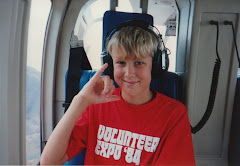Although false, this is a deeply ingrained popular belief, so much so that even I was a little apprehensive when my instructor told me that today we would practice descending without engine power.
The maneuver is called autorotation, because, as the helicopter descends, the blades are automatically rotated by upward flowing air, rather than the (failed) engine.
 The effect is similar to the way a maple seed spins gradually to the ground, as you can see in these videos of autorotation in a previous post.
The effect is similar to the way a maple seed spins gradually to the ground, as you can see in these videos of autorotation in a previous post.Despite my efforts to imagine riding a maple seed to the ground, I didn't really know what an autorotation would feel like. I guess I expected something like the freefall rides at Six Flags, or like the one they have on the Stratosphere building in Las Vegas. I hate those rides.
So I caught my breath when, while cruising at 1800 feet over immaculate black lava flows and a glistening blue tropical bay, my instructor said, "Autorotation in three....two....one."
He cut the throttle, and the engine tachometer needle collapsed to the bottom of its housing. For the briefest moment, I felt us fall, and my stomach threatened to rise into my ribcage.
Then, just as quickly, I settled back into my seat, and we kept flying. Sure, we were descending, but we definitely weren't falling. We weren't even descending that fast.
Over the course of the next minute, I watched as the ebony lava below gradually rose towards us. The helicopter was quieter without the engine noise, and there was a low, mechanical hum. It reminded me of driving down a mountain road in first gear. You feel the tension of the machine controlling your speed; you know that if you were forced to crash, you might be hurt, but you'd survive.
Before we reached the surface, Lee halted our descent completely with a quick adjustment of the blades, as he would if we really had to settle down without power. Rather than land this time, he re-engaged the engine, and we climbed back into the sky.
 So...would you rather have your engine fail in a helicopter, which can float down and settle softly to the ground just about anywhere, or an airplane, which needs several hundred feet of flat land and hurtles in at 60+ miles per hour? Spread the word.
So...would you rather have your engine fail in a helicopter, which can float down and settle softly to the ground just about anywhere, or an airplane, which needs several hundred feet of flat land and hurtles in at 60+ miles per hour? Spread the word.




No comments:
Post a Comment